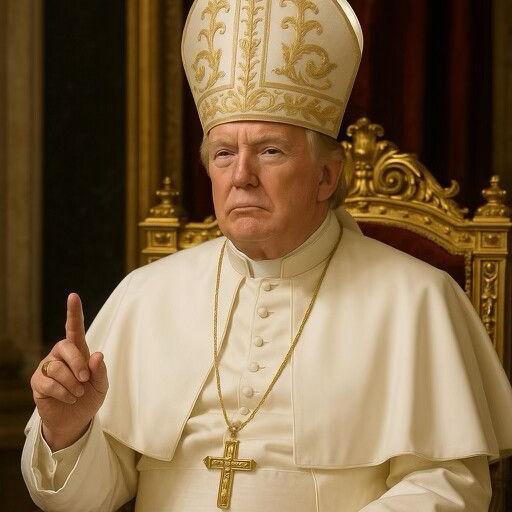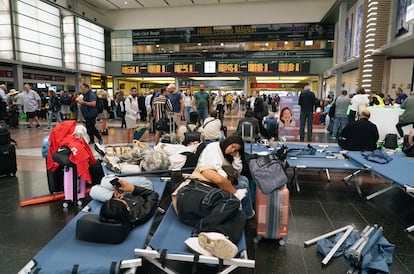Europe as a new police officer in World Trade? It’s not that far yet
:format(webp)/s3/static.nrc.nl/wp-content/uploads/2025/04/04183521/data130386785-9e760d.jpg)
Ursula von der Leyen, the most powerful woman in the European Union, has recently been to close trade agreements and maintaining the world order, that she sometimes starts to sound almost like her pass on the other side of the Atlantic Ocean.
« Countries stand in line to get started with us, » she poured them recently opposite Polricothe body magazine of the Brussels political bubble. « There is interest from so many countries to work more closely, » it was called In an interview with the Financial Times. And in Die Zeit the chairman of the European Commission still did a scoop: « We have no bros and oligarchs that make up the service. »
Von der Leyen is on a mission: maintaining Europe’s position in global free trade, now that the United States is in danger of falling away as a reliable trading partner and as the patron of the system. Time and again the head of the committee emphasizes what the EU has to offer the world: a predictable trade relationship with a market of wealthy European citizens and companies that eager to spend their euros, zloties and crowns.
Since the re -election of Donald Trump in the US, it led to a long list of foreign journeys. Negotiations that have been detained for years are suddenly pulled smoothly. In December, Von der Leyen, who has a mandate for this, signed her in Uruguay under an agreement with Mercosur, the South American country block. The EU countries still have to do that. But even France, which has been opposed to the agreement for more than twenty years, now seems willing to give his blessing to the deal.
And so it goes everywhere. Since last November, the EU has also conducted negotiations on the conclusion or expansion of agreements with, among others, India, Malaysia, Mexico, Thailand, the United Arab Emirates and Switzerland. There was an investment package for South Africa, and one for Central Asia, proudly presented by Von der Leyen in Uzbekistan. Even with China, which in most policy areas still counts as a rival superpower, the ties are cammed very carefully.
For example, the solution for the unrest on the world stage almost seems to bring back to a simple formula: a little less trade with the US, a bit more with India, China and Brazil, done job. But such a sum underestimated how great the consequences of a tilting world order warn economists. The EU will have to do much more if it wants to take care of the trade, let alone if Europe wants to take over the role of the US as a global market master.
« Let’s face it: the greatest economic relationship in the world is that between the EU and the US. If that relationship comes under pressure, we are worse off. Punt, » says Maria Demertzis, as an economist associated with Think Tank The Conference Board and earlier to the Brussels Think Tank Bruegel. « The question that matters is: is that relationship under pressure through things that we can influence, or by causes that are outside our power? »
Unhealthy dependency
It is too simple to only point to the choices of the White House, says Demertzis. Certainly, it is Trump who drives the current uncertainty, but in the process he exposes vulnerabilities that have been around for some time. « What is the first principle that you learn on a management course? Company continuity: how do I guarantee that I can continue to deliver my product or service as I have promised? That is priority number one, for the costs, for the win. In the world economy we have forgotten that principle. Now we see how vulnerable that makes us. »
This was of course already one of the lessons of the Corona Pandemie. There it was temporary shocks that brutally disturbed the trade chains. But it can also be long -term choices: what if a trading partner changes its mind and sets other priorities? « If the US wants it, all cloud services in Europe will stand still tomorrow. For our payment systems we are 70 percent dependent on the US, » said Demertzis.
Do we have to boycott these companies? « You can appreciate those services and say at the same time: this dependence is unhealthy. So you have to diversify and stand on your own two feet. And remember that the rest of the world also thinks so, and then the same question about Europe: is too much dependence on Europe a risk? They also want economic certainty. »
One route to make Europe more resistant to shocks is by directing the gaze in and strengthening its own market. At the moment the European economy is more important on export on the worldwide market than any other major economy, including Chinese. That means that every disruption of the system in Europe arrives harder than elsewhere.
Despite all the praising words of European politicians, the internal market is still underdeveloped. Trade barriers in the form of rules and logistical challenges make it difficult for companies within the EU to expand elsewhere in the Union. The International Monetary Fund calculated That these barriers turn out so expensive that they are equal to a levying of 44 percent for cross -border goods traffic, and even 110 percent for services.
The other route to make the continent more robust runs through the tires with as many other countries as possible. Then a shock in the global economy or a shift in the geopolitics is easier. And Europe has something to offer, Von der Leyen emphasizes with its argument about the honest and predictable trade with Europe.
Many countries do not see the EU at all as a trade block that revolves around honesty and predictability
Although? « Many countries will look at the EU and not see a trade block at all that revolves around honesty and predictability, » says Hosuk Lee-Makiyama, director of the European Center for Political International Economy. « The EU is a self -proclaimed regulatory superpower, which also regularly rewinds the rules. That means that you do not know where you will be in five years if you want to export wood or beef or an innovative service with AI to the EU. »
How high the tensions can go on, it became clear last year when the European Antiboskap Act was introduced. That law is intended to prevent illegal deforestation worldwide. Hout manufacturers, but also from coffee, soy and meat must be able to prove that no country has been defosed for their production if they want to sell their wares in Europe.
The governments in Indonesia, Malaysia and Brazil were furious: they saw no form of nature conservation in the plans, but extra regulations and paperwork, making it much more difficult for companies to export to Europe from their countries.
It did not help that the European Commission only came very late with clarity about the precise enforcement. And frustration increased further when the EU recently simplified the legislation for its own Member States by largely excluding them from the rules, because the risk of deforestation within the EU would be minimal. European forest producers were cheering: less bureaucracy. The non-European authorities were left behind.
Tangible benefits
The US may now attract attention in a negative sense, but the offer that the Americans made to the rest of the world from the Second World War was one with tangible benefits, says Hosuk Lee-Makiyama. From the 1950s and 1960s, the US has finished their trade barriers to much further extent than the EU, in terms of taxes and rules.
« As a result, they also have something to offer: free access to a gigantic market. The US was willing to accept a trade shortage of a trillion dollar, allowing Europe and the rest of the world to build a trade surplus for that amount, » says Lee-Makiyama. « And: the Americans build factories all over the world to tap new markets. What does Europe do? We build our factories on our own soil, we create the jobs here and then ship the goods. »
The United States built this world order with hard power and trade. Lee-Makiyama: « In fact, the US said: we are willing to run a trade deficit so that Europe and Asia can grow through export-if you follow our rules. I see neither Europe nor China willing to do the same to help South Asia and Africa through exports from poverty. »
The fact that the uncertainty of the current era forces political choices is clearly reflected in the European Parliament. There, politicians of all wind directions see these days the need for a trade policy that goes beyond an extra free trade agreement here or there.
On the one hand there is D66 party leader Gerben-Jan Gerbrandy, who now sees his plea for closer European cooperation confirmed. « Call it a Pax Europeanana, as the successor to the Pax Americana. If the US disappears, it is up to Europe to offer an alternative. »
That requires choices, he acknowledges. For example, Europe will need a fully -fledged territorial defense force and will have to think seriously about taking out common European loans to strengthen the euro. « The goal is not to operate on the world as a police officer, but we must be able to substantiate our economic power. »
On the other hand, the sound of Jessika van Leeuwen (BBB) sounds. Her party sees something else in the current era: the risks of interdependence. « We are basically for free trade, but we exclude something crucial as food security. » For that reason, Van Leeuwen is not very enthusiastic about the negotiations of the EU with Australia, Thailand and the Mercosur block.
The EU will also have to think very carefully about the conditions on other files, says Van Leeuwen. « Free trade exists by the grace of good rules. How much state aid do the Chinese cars that run here get? What about the quality of the Chinese goods that will soon be our way if they are no longer sent to the US? We can hardly check that now. »
And then the rest has to be convinced. “We are the free rider Been of the global economy, « says Hosuk Lee-Makiyama. » Cheap Russian gas, an American safety paraplu and a world market that bought all our exported things. Of course, Europe wants the old system to stay intact. But it is not surprising that many countries think the same as Trump: the current system is especially the good. «
Read also
Also read: Trumps tax policy is a settlement with decades of American belief in free trade

:format(webp)/s3/static.nrc.nl/bvhw/files/2025/04/data131541824-d4b076.jpg)
:format(webp)/s3/static.nrc.nl/images/gn4/stripped/data100722062-86c712.jpg)
:format(webp)/s3/static.nrc.nl/wp-content/uploads/2025/04/23101517/data131036632-5de55c.png)




